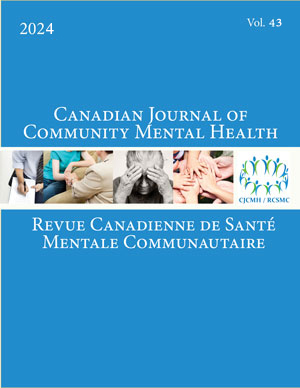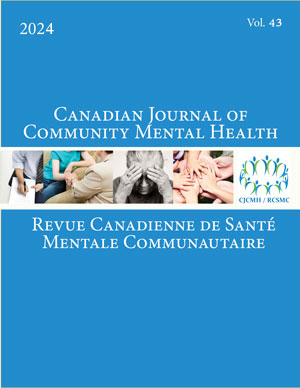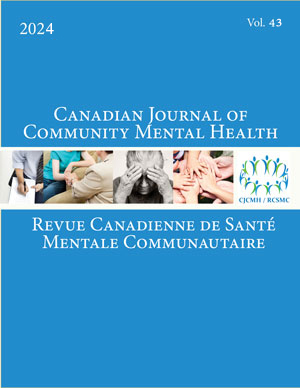Volume 34 • Number 4 • December 2015
Special issue: Mobilizing Canada's Mental Health Strategy
Special Issue
Articles
OPEN ACCESS
More For the Mind was published by the Canadian Mental Health Association in 1963. It reviewed the state of mental health services in Canada and called for transforming the delivery of mental health services from a neglected asylum-based system to a community-focused system where people could access services in general hospitals and the community. The article reviews the history of mental health services in Canada, the legacy of More for the Mind and the prospects for the reforms outlined in Changing Directions, Changing Lives.
OPEN ACCESS
To set the stage for this special edition on Responses to the Mental Health Strategy for Canada: Canadian and International Perspectives on Mobilizing Change, we discuss the role of ideas in the public policy literature and the influence of key ideas over the history of mental health policy. Drawing on academic and policy literature and feedback from a convenience sample of mental health policy makers, we integrate the concepts of recovery and well-being into a conceptual model that can be used by policy makers as a tool to realize the transformative ideas captured in the Mental Health Strategy for Canada.
OPEN ACCESS
International migration has led to increasingly diverse populations in many high-income countries. With approximately 250,000 newcomers each year, it should be no surprise that developing services that meet the needs of immigrants, refugees, ethnocultural, and racialized populations (IRER) is a major priority in the Mental Health Strategy for Canada. The published Canadian literature on the mental health of diverse populations concludes that differences in the exposure to social risk factors lead to differences in rates of illness for some groups. Whether rates of illness are high or low in a particular group, however, problems in accessing services are ubiquitous. Improving the service response will require political will, leadership, strategic planning, and data, and must include people with lived experience and the populations at highest risk. This paper outlines the “Issues and Options” paper commissioned by the Mental Health Commission of Canada, which used a thorough literature review and a national consultation to develop a model for service development. A health equity approach that utilizes local-population-based planning and the evidence-based interventions that are available for diverse groups could improve services for IRER groups in Canada.
OPEN ACCESS
A key priority of the mental health strategy for Canada is to establish a coordinated continuum of mental wellness (mental health and substance use) services for and by First Nations, which include traditional, cultural, and mainstream approaches. This paper describes developments critical to informing the strategy and helping to create foundations for systems change at all levels with positive impacts being created in First Nations communities across Canada. Key lessons include the need to create mutually cooperative and respectful working relationships that will foster collaborative partnerships with First Nations in order to effect change in communities, and the use of culture as a foundation to create lasting and meaningful change.
OPEN ACCESS
National frameworks are often put forward as a tool for local policy development, but little is known about their effectiveness. In this case study, the usefulness of Canada's Evergreen National Child and Youth Mental Health Framework (Evergreen) is examined in the development of a Yukon Child and Youth Mental Health and Addictions Framework (CYMHAF). Evergreen content and processes and the reflections of key informants and the research team are analyzed. The findings suggest that national frameworks can play important roles at the program and strategic levels, saving time and money in developing local frameworks, strengthening rigour, and helping to build consensus among local policy-makers.
OPEN ACCESS
The effects of parenting on the healthy development of children and adolescents, and on preventing behavioural, emotional, and social problems, are pervasive. A public health approach to parent education and support can have major impact on the mental health of Canadians. Many of the values and strategic directions advocated by the Mental Health Commission of Canada can be realized in a population-based system for parent support such as the Triple P Positive Parenting Program. Triple P's core principles, program components, and means of implementation are described, with illustrations from across Canada.
OPEN ACCESS
In Canada, unpaid caregivers in the context of mental health are starting to receive the attention they deserve. To a certain extent, caregiving in other domains has been already recognized as an essential component of care, especially caregiving to frail elderly and those with Alzheimer's disease and dementia. Caregivers of a loved one with mental illness, however, have hardly been on the radar until recently. This report provides contextual background and a brief history of some recent, positive developments in Canada in addressing the needs of caregivers of family members who have mental health problems or illnesses. The role of family caregivers is being defined with increasing precision. Grassroots organizations and government-sponsored institutions are articulating responsive policies for bringing caregivers into the spotlight. While in its early days, there appears to be growing momentum in recognizing the crucial role family caregivers play in the recovery process in mental illness, the special needs that caregivers themselves have as a result of this role, and the economic burden of failing to accord caregivers a prominent place in any overall strategy for dealing with mental health issues on a national level.
Commentary
OPEN ACCESS
This commentary imagines what responses to mental distress on Planet Earth might look like to a rational, humane alien from a planet where responses to people with mental distress are compassionate and just. The alien visits Canada and New Zealand and concludes that discrimination skews social and service responses and that the narrow, deficits approach to services does not improve outcomes. Despite this, the alien perceives little sense of urgency for change. The alien then describes the recovery-oriented responses on their own planet and makes recommendations for system change on Planet Earth. The alien points out that deep change in a system with finite resources will require removing the “control” elements of services, closing hospitals, and reducing the dominance of biological psychiatry. The alien emphasizes that it is not sufficient just to build the leadership of people with mental distress, provide a broader range of services for diverse cultures and communities, and promote social inclusion if the failed elements of the old system remain.










